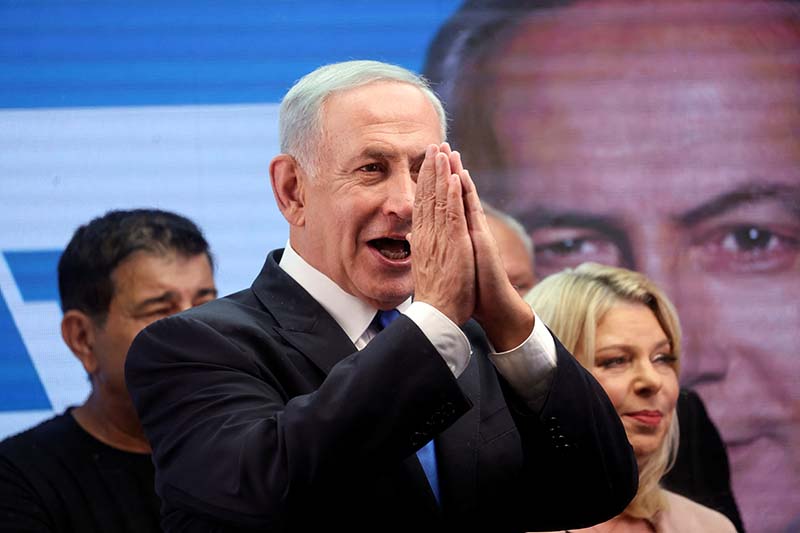Former Israeli Prime Minister Benjamin Netanyahu appeared well placed to return to power after exit polls following Tuesday’s election showed his right-wing bloc heading for a narrow majority lifted by a strong showing from his far-right allies.
Israel’s longest-serving premier, on trial over corruption charges which he denies, was poised to take 61-62 seats in the 120-seat Knesset, according to Israeli television exit polls.
The early exit polls may differ from the final result of the election, which is not expected until later in the week. But the results pointed to a strong showing by the right, which had been seen falling just short of a majority.
“Of course I’m happy. I only hope it keeps rising,” said Likud lawmaker Dudi Amsalem. “We will strengthen Jewish identity, and we will strengthen law and order.”
Israel’s fifth election in less than four years exasperated many voters but turnout was nonetheless reported at the highest levels since 1999.
The campaign was shaken up by far-right firebrand Itamar Ben-Gvir and his ultra-nationalist Religious Zionism list, now poised to be the third-largest party in parliament after surging in from the political margins.
Security on the streets and soaring prices topped the list of voter concerns in a campaign triggered by defections from centrist Prime Minister Yair Lapid’s unlikely ruling coalition of right-wing, liberal and Arab parties.
But policy issues have been overshadowed by the outsized personality of Netanyahu, whose legal battles have fed the stalemate blocking Israel’s political system since he was indicted on bribery, fraud and breach of trust charges in 2019.
Netanyahu, 73, has been counting on support from Ben-Gvir and fellow far-right leader Bezalel Smotrich, who have moderated some extreme positions but still call for anyone deemed disloyal to Israel to be expelled from the country.
The prospect of a government including Ben-Gvir, a former member of Kach, a group on Israeli and U.S. terrorist watchlists, and who was once convicted for racist incitement, risks alarming allies including Washington.
The campaign, which opened weeks after a brief conflict with the militant Islamic Jihad group in Gaza in August, has also unrolled against a backdrop of increasing violence in the occupied West Bank, with near-daily raids and clashes.
Lapid, whose camp was poised to take 54-55 seats, according to the polls, had campaigned on his stewardship of Israel’s strong economy as well as diplomatic advances with countries including Lebanon and Turkey but it was not enough to stop the right.







Click here to change your cookie preferences